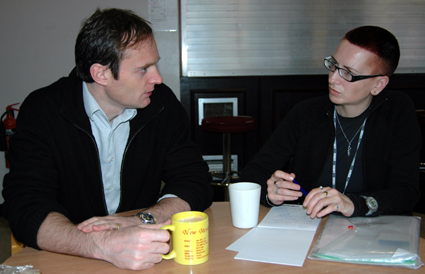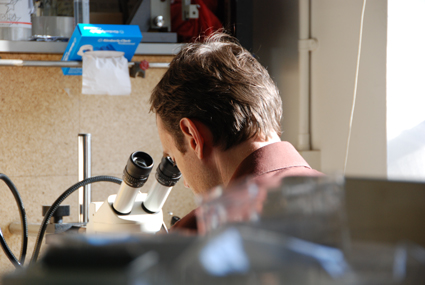Conversations with Malcolm Logan
 Photo: Julie Newman |
Ju: What is the focus of your research?
Malcolm: We study how the limbs of the developing embryo develop normally and how this process has been disrupted in various diseases. We are a 'basic' or 'fundamental' research lab. We study the mechanisms that regulate biological processes in order to understand how disruption of these processes leads to disease.
Ju: What does this involve? What are you working on at the moment?
Malcolm: We use various animal models (mouse, chick, fish) and some cell culture techniques to study the function of genes during normal limb development and to produce models of human diseases. Two genes we are studying at present are associated with human congenital (inherited) disorders. Mutations in the gene Tbx5 are associated with Holt-Oram syndrome. Affected individuals have forelimb abnormalities and heart defects. The limb abnormalities can range from absent thumbs to more severe loss of multiple skeletal elements. Mutations in a related gene Tbx4 are associated with Small-Patella syndrome (SPS). Individuals with SPS have defects in their knee caps (patella) and pelvic girdle.
Ju: What made you feel passionately enough about this area of research to choose it?
Malcolm: I have been interested in science, medicine and human disease for as long as I can remember. Studying biochemistry was an opportunity to learn about the 'chemistry of life'. Doing my degree I was exposed to the field of molecular biology and the power of these techniques to study biology from the genome/genetic level upwards. I also had my first exposure at this time to the field of developmental biology that I am working in now.
Developmental biology was then and continues to be a 'hot' field of scientific research, as scientists have been able to apply the new techniques of molecular biology to the older field of embryology. This has led to rapid developments in our understanding of the mechanisms that regulate animal and plant development, which has had enormous impact on human and animal health and agriculture.
Ju: How did you train for it? What was your career path?
Malcolm: I did a BSc degree in Biochemistry. I then did my PhD studying heart development. Following my PhD, I did post-doctoral work in the USA studying limb development. After five years in the USA, I returned to the UK to start my own independent lab.
Ju: What do you ultimately hope to achieve from it?
Malcolm: I hope that my lab can make a significant contribution to our understanding of embryonic development, and that these discoveries will have an impact on human health. In addition, from a purely intellectual point of view, I think the type of work we do - to further human knowledge - is worthwhile.
Ju: What are the benefits around regrowing limbs and organs?
Malcolm: This can have an enormous impact on human health. Organ failure is a major contribution to diseases leading to sudden death (e.g. heart attack) and long-term illnesses (such as diabetes and kidney failure). The ability to grow replacement organs would be a revolution in health care. Relatively little attention has been given to re-growing limbs, since limb abnormalities, although negatively impacting on quality of life, are very unlikely to lead to a fatality. Affected individuals will receive the care they need to survive. Re-growing a limb for an individual who was either born without one or has lost one due to an accident in one long-term goal.
Some shorter-term goals, and perhaps to some extent less ambitious ones, are to produce replacement tissues to treat diseases of the musculoskeletal system. For example, articular cartilage does not regrow or heal well after damage and will result in debilitating, progressive arthritis. Current treatments largely deal with pain management. Being able to regrow articular cartilage for patients would be of great clinical relevance, particularly with an increasing ageing population.
Ju: What are some of the known concerns?
Malcolm: Stimulating cell regeneration requires stimulating cells to proliferate. It is critical that this is exquisitely controlled, as occurs during normal development. If cell proliferation is stimulated in an unregulated way, this may lead to abnormal growth and a cancerous tumour could result.
Ju: How close are we really to being able to regrow limbs? Do you think it will ever be possible, based on what we know at present?
 |
Malcolm: We are still a long way off from being able to re-grow a limb in an adult animal. It is not possible to do this based on current knowledge: however, we would hope that as our understanding continues to expand rapidly it may become a possibility in the future.
Ju: How has the development of computer and related technologies affected your work?
Malcolm: Computers and IT developments have a significant effect on how we can process the data from experiments and present them. Computers provide excellent analytical tools for our research.
Ju: And to what extent is the biology unaffected by advances in IT? For example, doesn't it still take cells the same time to develop regardless of how fast a computer operates?
Malcolm: Certainly the speed of a computer will have no effect on the development of a cell or an embryo. Working with biological systems can be very frustrating because the course of an experiment will be dictated by the organism under study and not necessarily by the experimenter! Computers are tools for us, but cannot dictate or predict how an experiment will unfold.
Ju: One focus of my project is to explore the way in which we perceive and define normality. How do you think society's ideas about what is normal affect your work?
Malcolm: As scientists we are members of society. Scientists are perhaps shaped more by society's ideas than we as scientists (as a collective) have an influence on shaping society's ideas.
Ju: Have you got an opinion on how children and adults with unusual limbs are treated in the media? Do you think we still have a 'freak show' approach to people who look unusual?
Malcolm: Channel 4 and its ilk seem to be continuing the circus freak show tradition with some of their output. People still watch, so there seems to be some market for it at least. This does seem to run contrary to the accepted norm of contemporary society in which I would hope that people are accepted for what they are and provided with the help they may require to get on with their lives.
Ju: Another focus of my project is to develop a 'scientific' model of disability that is distinct from the 'medical model' of disability. How do you think scientists view disability? Do you think this has changed significantly over the past few decades?
Malcolm: A scientist might view an individual with a disability from two angles. One, what has gone wrong in order to cause the disability in the first place?, and two, what can/could be done about it? I think the 'could be' i.e. future outlook is particularly important, and may be a distinguishing point between a medic who has to deal with the patient in the present. A researcher is, or can be, more detached. This detachment may enable more reflection on the 'syndrome' or characteristics
Ju: In reality, to what extent is working in a research lab similar to working in an office?
Malcolm: I imagine the social interactions with work colleagues are very similar to that in an office. You get the same 'water cooler gossip', the same personalising of the work environment - this might entail placing a furry toy on the end of a test-tube rack rather than a biro, but the principle is the same.
Ju: Do you think the stereotype of the research scientist has changed at all over the years? Or have views of scientists as god-like figures with power over life and death simply become more extreme? Do you think our exaggerated beliefs in the power of scientists affect scientists ability to work? For example, do you think our fears about the impact of science are exaggerated because we think that scientists are more powerful than they are?
Malcolm: I think there is reason to worry that irrational concerns about experiments based on ill-informed beliefs (or a deliberate refusal to accept certain realities of life) will inhibit scientific progress. It is right that what scientists get up to is properly regulated and that the general public is kept informed of what work is carried out, particularly if it is carried out using their tax pounds.
Often unjustifiable or groundless concerns are generated by the public being misinformed or ill-informed by the media. Sensationalist, headline-grabbing pieces can do enormous damage. The concerns raised over the MMR vaccine have caused a public health disaster. We are now beginning to see the effects of parents failing to immunise their children properly. The health of the nation's children takes an alarming step backwards.
The concerns over the production of hybrid embryos have also been completely overblown through lazy journalism. People are given the impression that freakish chimeras will be produced when this is simply not the case. There are ethical considerations that need to be properly addressed when considering this type of work, but the dialogue that is produced through sensationalising what is proposed serves no one.
Isn't there something of a contradiction in the general public's opinion of science and scientists? On the one hand great things are expected of science and scientists - it/they will cure all that ails us, science will clean up the environmental mess we have made of the planet, science will enable us to feed the ever increasing global population, science will generate all the gadgets that improve our quality of life (for some this might be an electric toothbrush, for others an Xbox360). In complete contrast, science and scientists also appear to be regarded with suspicion by the same people. A 'natural'- let's say plant derived-chemical is somehow 'healthier' than the same chemical produced in a laboratory. Why?
© Ju Gosling aka ju90 & Malcolm Logan 2008
| Funded by the |
 |
| Dr Ju Gosling aka ju90's ABNORMAL: How Britain became body dysphoric and the key to a cure is available now for just £3.09 for the Kindle or in a limited-edition hardback with full colour art plates for £20 inc UK P |